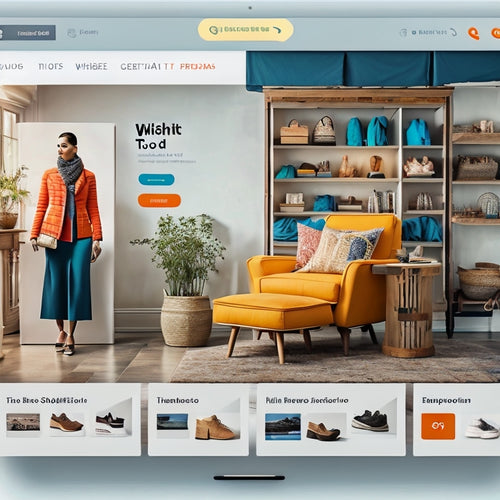
Building a Successful Shopify App: Challenges and Strategies
Share
This article explores the challenges and strategies involved in building a successful Shopify app.
A Shopify app is a versatile tool used for creating online stores, managing inventory, and analyzing sales statistics. Its features, such as product catalogs, customer accounts, shipping options, sales promotion, and payments, contribute to its value.
However, the cost of building a Shopify app can range from $15,000 to $25,000, with development time averaging around 267 hours.
This article aims to provide tips and tutorials to navigate the complexities of Shopify app development, while highlighting the benefits and risks associated with this process.
- Building a successful Shopify app requires convincing current and non-Shopify users of the platform's value.
- Strategies such as advertising success stories through infographics on social channels and using referral programs and special discounts can help drive growth of a Shopify app.
- Shopify's SaaS products and services can attract new users and make the platform appealing to non-users.
- Risks and challenges in building a Shopify app include handling user data and implementing proper security measures to protect the platform from unauthorized access, as well as complying with laws related to data protection.
Benefits and Challenges of Building a Shopify App
This discussion will focus on the benefits and challenges of building a Shopify app.
The benefits include the ability to create online stores, view sales statistics, and manage inventory, along with features such as product catalogs, customer accounts, shipping options, sales promotion, and payments.
However, there are also challenges in app development, such as security risks and the need for measures to protect user data, as well as considerations regarding time and cost.
Strategies for app growth, such as advertising success stories and using referral programs, will also be discussed.
Benefits of Shopify App Development
One advantage of Shopify app development is that it enables users to create online stores, view sales statistics, and manage inventory.
Integrating with Shopify offers several benefits, including access to a wide range of built-in features and functionalities for building interfaces such as product catalogs, customer accounts, shipping options, sales promotion, and payments. This allows users to create a seamless and user-friendly online shopping experience.
Additionally, Shopify provides monetization strategies for app developers, such as app subscriptions, revenue sharing, and advertising opportunities, which can help generate income from their apps. By leveraging these strategies, developers can maximize their app's potential and increase revenue streams.
Overall, Shopify app development offers a robust platform for users to build and grow their online stores while providing opportunities for developers to monetize their apps effectively.
Challenges in App Development
Implementing robust security measures is crucial in Shopify app development to ensure the protection of user data and to comply with legal requirements related to data handling and privacy.
Building a successful Shopify app requires addressing the challenges associated with user data protection and privacy. Effective marketing techniques and user engagement strategies are essential for attracting new users and driving growth. Advertising success stories through infographics on social channels and implementing referral programs and special discounts can help in achieving this. Additionally, Shopify can showcase itself as a platform offering SaaS products and services to convince current and non-Shopify users of its value.
However, risks and challenges exist in terms of unauthorized access to user data and compliance with data protection laws. Therefore, it is crucial to implement proper security measures and ensure legal requirements are met to safeguard user information and maintain trust.
Security Risks and Measures
The protection of user data and compliance with legal requirements related to data handling and privacy are key considerations in Shopify app development. Security risks exist that may compromise user information. To mitigate these risks, developers must implement robust security measures to safeguard user data and prevent unauthorized access.
This includes encryption techniques to protect data in transit and at rest, secure authentication mechanisms to ensure only authorized users can access sensitive information, and regular security audits to identify and address vulnerabilities.
Additionally, developers must adhere to relevant data protection laws and regulations, such as the General Data Protection Regulation (GDPR), to ensure the platform meets all legal requirements for data protection.
Strategies for App Growth
To facilitate the successful growth of a Shopify app, developers can leverage various marketing techniques.
For user acquisition, showcasing success stories through infographics on social channels can be effective in attracting new users and making the platform appealing to non-users.
Additionally, implementing referral programs and special discounts can drive user acquisition by incentivizing existing users to refer others to the app.
These strategies not only help in acquiring new users but also contribute to customer retention by providing a positive user experience and value proposition.
By showcasing success stories and offering incentives, developers can create a sense of trust and loyalty among users, leading to increased customer retention.
This approach aligns with the desired innovation of the audience, as it focuses on user-focused marketing techniques to drive the growth and success of the Shopify app.
Time and Cost Considerations
In order to successfully build a Shopify app, it is crucial to consider the time and cost considerations involved.
The time required to build a Shopify app typically ranges from 200 to 333 hours, with an average estimate of 267 hours. The timeline for development depends on the complexity of the app, including factors such as custom designs and niche features.
On the other hand, the cost of building a Shopify app usually falls within the range of $15,000 to $25,000, with an average cost of $20,000. The total cost is influenced by the number of features and functionality required. Proper project management is essential to ensure timely completion within budget.
Additionally, prioritizing user experience throughout the development process is crucial to create a successful Shopify app.
Tips for Building a Successful Shopify App
This discussion will focus on key points for building a successful Shopify app.
Key features for success may include building interfaces for product catalogs, customer accounts, shipping options, sales promotions, and payments.
User engagement strategies may involve advertising success stories through infographics on social channels and using referral programs and special discounts to drive growth.
Effective marketing techniques may be employed to convince current and non-Shopify users of the platform's value.
Overcoming common obstacles may entail implementing proper security measures to protect user data and complying with laws related to data handling and protection.
Key Features for Success
Key features for the success of a Shopify app include building interfaces for product catalogs, customer accounts, shipping options, sales promotion, and payments, which are shared by popular online shopping apps like Amazon, eBay, and Etsy. These features are essential for enhancing customer engagement and providing a seamless shopping experience.
A well-designed product catalog interface allows users to easily browse and search for products, while a customer account interface enables customers to track their orders and manage their preferences. Shipping options and payment interfaces provide convenience and flexibility, allowing customers to choose their preferred delivery method and payment method.
Additionally, sales promotion features such as discounts, coupons, and loyalty programs can drive customer engagement and incentivize repeat purchases.
User Engagement Strategies
User engagement strategies for a Shopify app involve:
- Implementing advertising success stories through infographics on social channels
- Utilizing referral programs and special discounts to drive growth
- Attracting new users while making the platform appealing to non-users
To ensure user retention, it is essential to focus on:
- Creating a seamless user experience
- Providing valuable and relevant content
- Offering personalized recommendations
Additionally, implementing gamification elements such as:
- Loyalty programs
- Rewards
Can incentivize users to remain engaged with the app. App monetization can be achieved through various methods, including:
- In-app purchases
- Subscription models
- Advertising partnerships
It is crucial to carefully analyze the target audience and market trends to determine the most effective monetization strategy. Regularly monitoring user behavior and feedback will also allow for continuous improvement and optimization of the app's engagement and monetization strategies.
Effective Marketing Techniques
To effectively market a Shopify app, it is important to implement a comprehensive marketing strategy. This strategy should include targeted advertising campaigns, strategic partnerships, and leveraging social media platforms.
Social media marketing plays a crucial role in reaching a wide audience and driving app downloads. By creating engaging content and utilizing social media analytics tools, app developers can identify and target specific demographics that are most likely to be interested in their app.
Additionally, forming influencer partnerships can greatly enhance app visibility and credibility. Collaborating with influencers who have a strong presence in the app's target market can help increase brand awareness and attract potential users. These partnerships can involve sponsored content, product reviews, or endorsements, all of which can help generate buzz and drive app downloads.
Overcoming Common Obstacles
Overcoming common obstacles in the development and marketing of a Shopify application requires careful consideration of potential technical issues, legal compliance, and the need for effective security measures to protect user data and ensure a smooth user experience.
In terms of technical issues, developers must address compatibility with different devices and browsers, optimize performance, and ensure seamless integration with Shopify's API.
Legal compliance involves adhering to data protection regulations, privacy laws, and intellectual property rights.
Additionally, implementing robust security measures is crucial to prevent unauthorized access and protect sensitive user information.
To overcome these obstacles, developers can employ user retention strategies such as providing regular updates, offering personalized recommendations, and optimizing the user interface for enhanced usability.
Helpful Tutorials for Building a Successful Shopify App
One useful resource for developers seeking to build a successful Shopify app is a collection of helpful tutorials available online.
These tutorials provide step-by-step guidance on various aspects of app development, including designing user interfaces, integrating APIs, implementing payment gateways, and optimizing performance.
The tutorials address common challenges faced by developers during the app development process, such as handling user data securely, ensuring compliance with legal requirements, and optimizing the app for different devices and platforms.
They also provide insights into best practices and innovative techniques that can enhance the functionality and user experience of the app.
Learn More: Shopify App Development Best Practices
Implementing industry best practices is crucial for developers seeking to create high-quality Shopify apps that meet the expectations of users and adhere to standards for security, usability, and performance.
To ensure success, developers should follow certain best practices throughout the app development process. Firstly, it is important to prioritize user experience by designing intuitive interfaces, optimizing loading times, and conducting user testing to gather feedback for improvements.
Additionally, developers should focus on app monetization by implementing effective strategies such as offering in-app purchases, subscription models, or advertising partnerships.
It is also essential to prioritize app security by following Shopify's guidelines for data encryption, authentication, and authorization.
Furthermore, developers should regularly update their apps to fix bugs, add new features, and improve overall performance.
Frequently Asked Questions
How Can I Attract New Users to My Shopify App?
User acquisition strategies for a Shopify app can include increasing app visibility through targeted advertising, leveraging social media channels, offering referral programs, and providing special discounts. These tactics aim to attract new users and drive growth.
What Are Some Common Security Risks Associated With Building a Shopify App?
Common security risks associated with building a Shopify app include data breaches and inadequate secure coding practices. These risks can lead to unauthorized access, compromised user data, and non-compliance with data protection laws. Implementing proper security measures is crucial to mitigate these risks.
Are There Any Legal Requirements or Regulations Regarding Data Protection for Shopify Apps?
Legal requirements and regulations for data protection in Shopify apps include implementing measures to prevent data breaches and ensuring user consent is obtained for data handling. Compliance with laws and regulations is necessary to protect user information and maintain trust in the platform.
How Can I Optimize the Performance and Functionality of My Shopify App?
To optimize the performance and enhance the functionality of a Shopify app, developers can focus on improving code efficiency, minimizing external dependencies, optimizing database queries, implementing caching mechanisms, and conducting thorough testing and debugging processes.
What Are Some Best Practices for Marketing and Promoting My Shopify App?
Marketing strategies and app promotion are essential for the success of a Shopify app. Effective approaches include showcasing success stories, utilizing referral programs and discounts, and highlighting the platform's value to attract both current and non-Shopify users.
Related Posts
-

3 Best Online Courses for Entrepreneurial Success Today
You're likely no stranger to the challenges of building a successful online business, but you know that staying ahead...
-

The Importance of Wishlist Functionality and App Options for Shopify
This article explores the significance of wishlist functionality and the various options available for implementing ...
-

Which Is the Best Email Marketing App for Shopify
This article aims to provide an objective analysis of the best email marketing app for Shopify. It will discuss the ...


